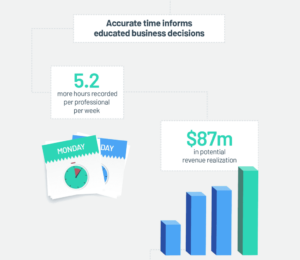Similar to many of their peer professional services firms, accounting firms are undergoing a tremendous transformation in this era of cloud, big data, mobile, AI, and social innovation. Automation and AI are driving down prices as many low-end services like tax inquiries are answered by machines, while humans move on to higher value work.
In this evolving paradigm of work distribution between humans and machines, accountants have to become much more client-centric. This means spending more time with clients and improving timely delivery of services while also updating their credentials and staying abreast of ongoing tax and regulatory changes. Yet many firms struggle with improving the quality and quantity of time spent on client engagements.
Accountants, the client-facing professionals, are often burdened with filling up tedious timesheets—a task they may understandably delay until the last minute. This procrastination, coupled with human error and lack of visibility into time allocation for end-to-end client service delivery, can have a crippling effect on the business of an accounting firm, which often relies on fixed-fee engagements. Lack of efficiency in time tracking turns into revenue loss quickly.
But this can change. It all starts with one small step, which is adopting the right time tracking software.
Most time tracking tools in the market are clunky, outdated data-gathering aids. They simply record the data, which is then dumped somewhere in the IT infrastructure, inaccessible to anyone. Mobility is also a challenge: As we move into an era where we are not tethered to our desks, accountants must also serve their clients via different avenues, collaboration tools, and devices. Yet some of the traditional time tracking tools only work on a laptop or desktop. Worse, they are designed as stand-alone systems, without any API integrations to other employee and client-engagement software.
Modern accounting firms would benefit immensely by embracing new technology for time tracking that includes built-in AI capabilities to capture all the different work activities associated with serving a client.
We developed Intapp Time with our customers—i.e., professional services firms—in mind, to help drive their business outcomes, such as revenue realization, visibility, and accessibility.
Intapp Time has a built-in passive capture feature, which seamlessly integrates with each individual’s daily work activities to produce automated recommendations for time tracking across client engagements. With a calendar view, easy mobile access, and pre-populated time tracking information, accountants can save significant time by removing the need to fill in tedious timesheets. The data gathered for each client engagement over time will enable the prediction of future pricing decisions for fixed-fee engagements. And at the firm level, the enhanced visibility across all projects, via dashboards, enables better-informed personnel decisions.

We have seen our customers across the professional services segment benefit immensely from using Intapp Time. They achieved significant business outcomes, such as improving their revenue realization and profitability. The intuitive interface, mobile access, and ease of use have been a hit with professionals as well.
Want to learn more? Our white paper dives deeper into how modern accounting firms are leveraging total time management for increased revenue realization.